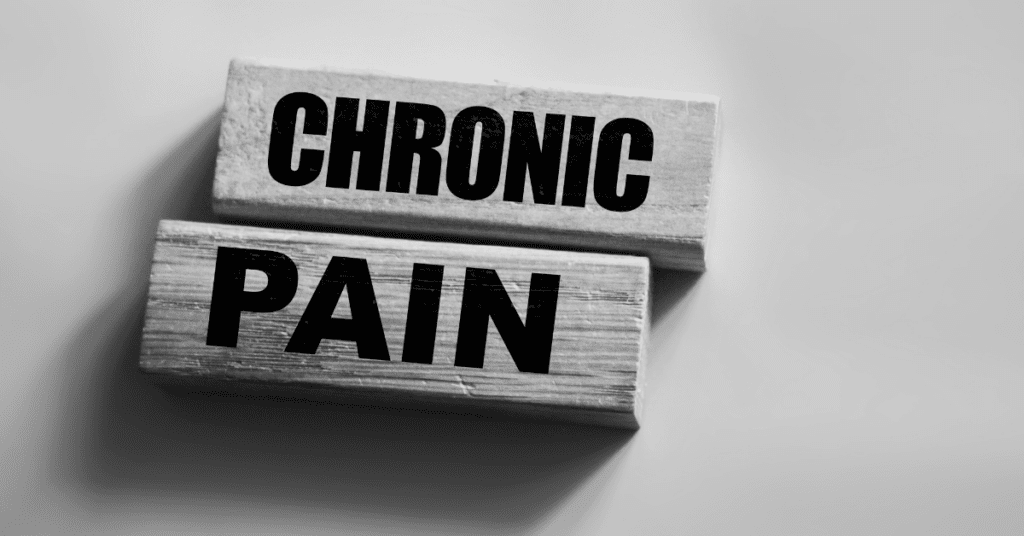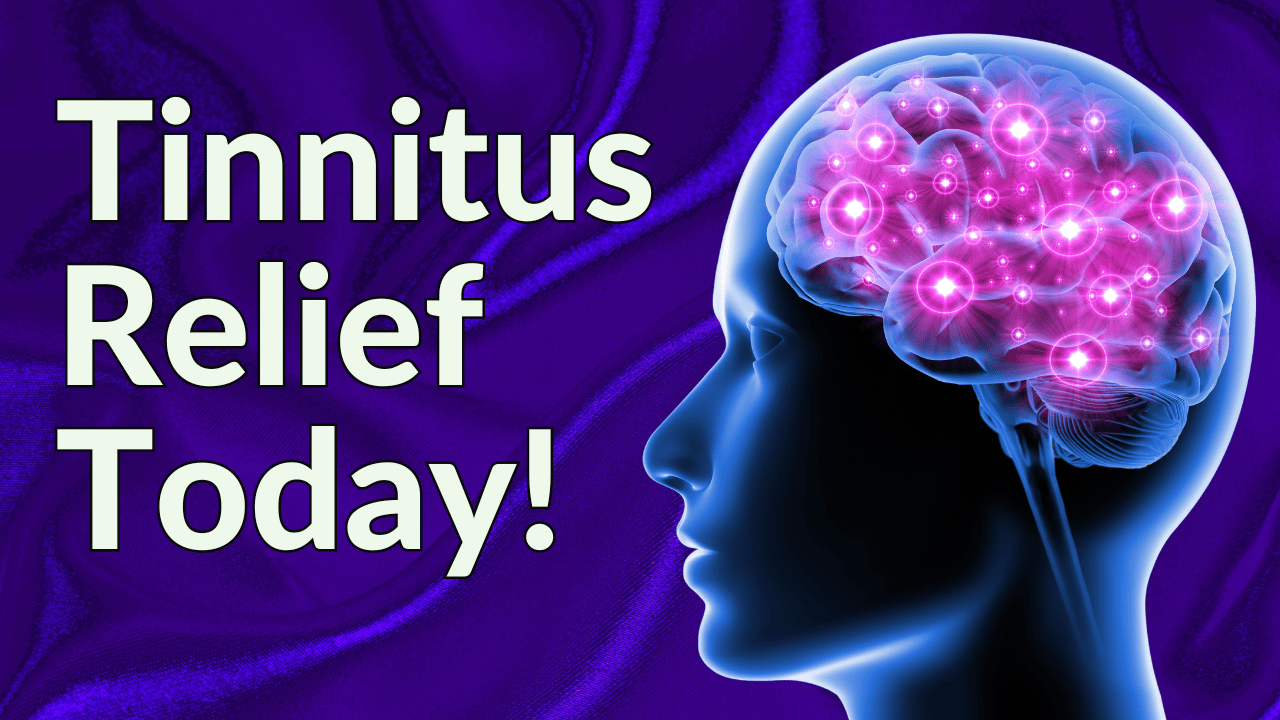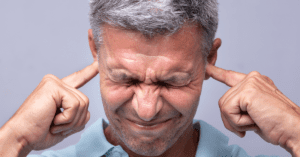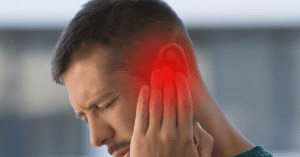If you live with chronic pain and also experience tinnitus, you are not alone. Studies show that people with chronic pain have a higher risk of chronic tinnitus – but why? Over the years, researchers have explored the link between tinnitus and pain. They’ve discovered that one does not necessarily cause the other, but there are similarities in the way the brain interprets these stimuli.
What Is Tinnitus?
Tinnitus – that is, the perception of sound when there is no external source – is most often related to hearing loss. Oftentimes, those with hearing loss also develop tinnitus, and this hearing damage can be caused by age-related changes, loud noise exposure, ototoxic medications, illnesses, and more.
"Treble Health helped me reduce my tinnitus by about 80%, and now I can live my life again!"


"Treble Health helped me reduce my tinnitus by about 80%, and now I can live my life again!"
– Steve D.
Book a free consultation to learn which Treble Health solution is right for you. Join Steve and thousands more who have found lasting tinnitus relief.
Tinnitus may be experienced “in your head” but just like chronic pain, it is not imaginary. Tinnitus is a very real symptom that may be associated with painful conditions. For some tinnitus patients, the constant ringing in the ears may be a symptom of health conditions like temporomandibular joint disorders (TMJ), headaches, fibromyalgia, infections, or injuries. The constant presence of this phantom sound can be emotionally exhausting and distressing, which can lead to depression, anxiety, insomnia, and greatly impact your overall quality of life.
What Is Chronic Pain?
As many as 40% of Americans suffer from chronic pain, which the Center for Disease Control and Prevention (CDC) defines as pain that lasts for three months or more. The intensity, type, cause, and impact of this pain can vary greatly from person to person – just as with tinnitus. For some people, chronic pain may stem from joint or muscular conditions, cancer, headaches, arthritis, nerve damage, or injuries, but this is not always the case.



Like bothersome tinnitus, chronic pain can affect your emotional and mental well-being. Studies show that chronic pain is linked with depression, dementia, substance abuse, and a decreased quality of life. If you’re living with chronic pain, it’s important to take your well-being seriously and seek medical help for managing your symptoms.
How The Brain Translates Sensory Stimuli Into Pain Signals
For both pain and tinnitus, the brain is receiving information that causes an increase in nervous system activity, and the brain’s actual process of interpreting these stimuli is remarkably similar.
In some cases, tinnitus and pain seem inextricably linked. On an anatomical level, your pain does not need to be centralized to your ears to contribute to tinnitus.
Two areas of the brain, called the nucleus accumbens and the ventromedial prefrontal cortex, act as the central gatekeeping system that filters information to determine what’s relevant and what can be ignored. These two regions play a part in regulating your emotions, decision-making, and executive function – it’s this process that dictates the way your brain responds to stimuli – including sound and physical sensations.
These areas of the brain are plastic, which means that they can change and adapt with time and experience. Brain plasticity (or neuroplasticity) is key to changing our responses to stimuli – this essentially means rewiring the brain. If you have been exposed to prolonged sensory stimuli like pain from an injury, the nucleus accumbens and the ventromedial prefrontal cortex “wire” the brain to focus on the sensation. Over time, it becomes difficult to filter out sensations that would normally be ignored, and the brain does not stop processing input – even after the stimulus is no longer present.
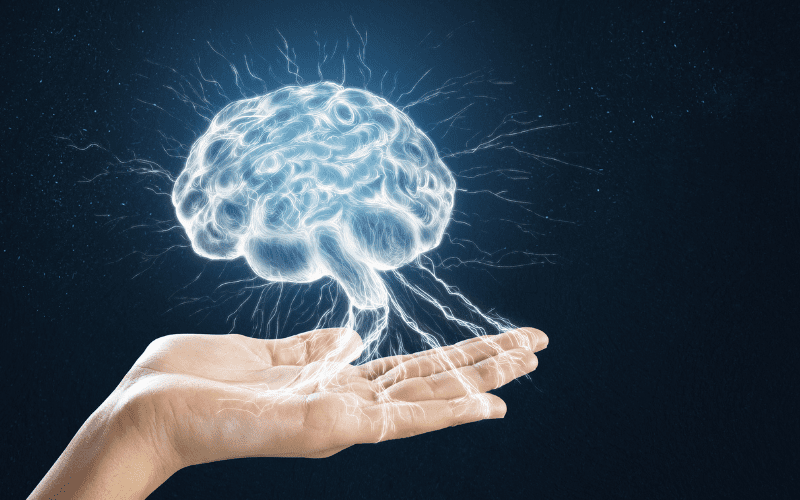

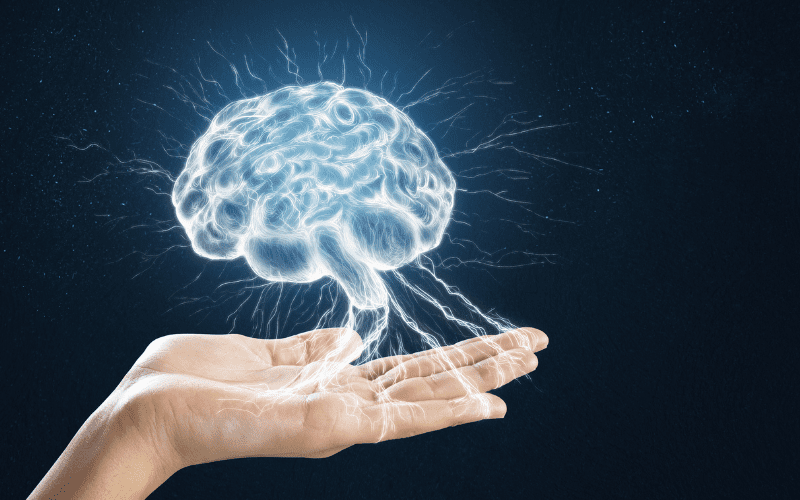
How Ringing Ears Are Connected To Chronic Pain
Researchers are getting a stronger understanding of the way the brain processes stimuli and the way these subjective sensations can become chronic conditions.
Tinnitus And Associations With Chronic Pain: The Population-Based Tromsø Study (2015–2016)
One study compared the perception of chronic pain and tinnitus across a large population. These two subjective conditions, researchers noted, are often accompanied by hypersensitivity, to both physical pain and sound.
Hyperacusis – that is, increased sensitivity to everyday sounds – is common for both those with tinnitus and those with pain, suggesting that there could be pain signals that spread from one area of the brain to another. The study supported this finding, discovering that tinnitus can be triggered by sensations other than sound (for example, jaw pain or headaches that trigger somatic tinnitus). This pointed to a direct link between the auditory and pain systems in the brain, which aligned with the known increased prevalence of tinnitus among those with chronic pain.
Frontostriatal Gating Of Tinnitus And Chronic Pain
Another study specifically explored the central gatekeeping system of the nucleus accumbens and the ventromedial prefrontal cortex. Researchers found clear parallels in these systems, which shows that the brain systems are related. When these systems are compromised, they proposed, people can develop chronic tinnitus and chronic pain that has a significant impact on well-being and behavior.
Neuroscientists Uncover Brain Abnormalities Responsible For Tinnitus And Chronic Pain
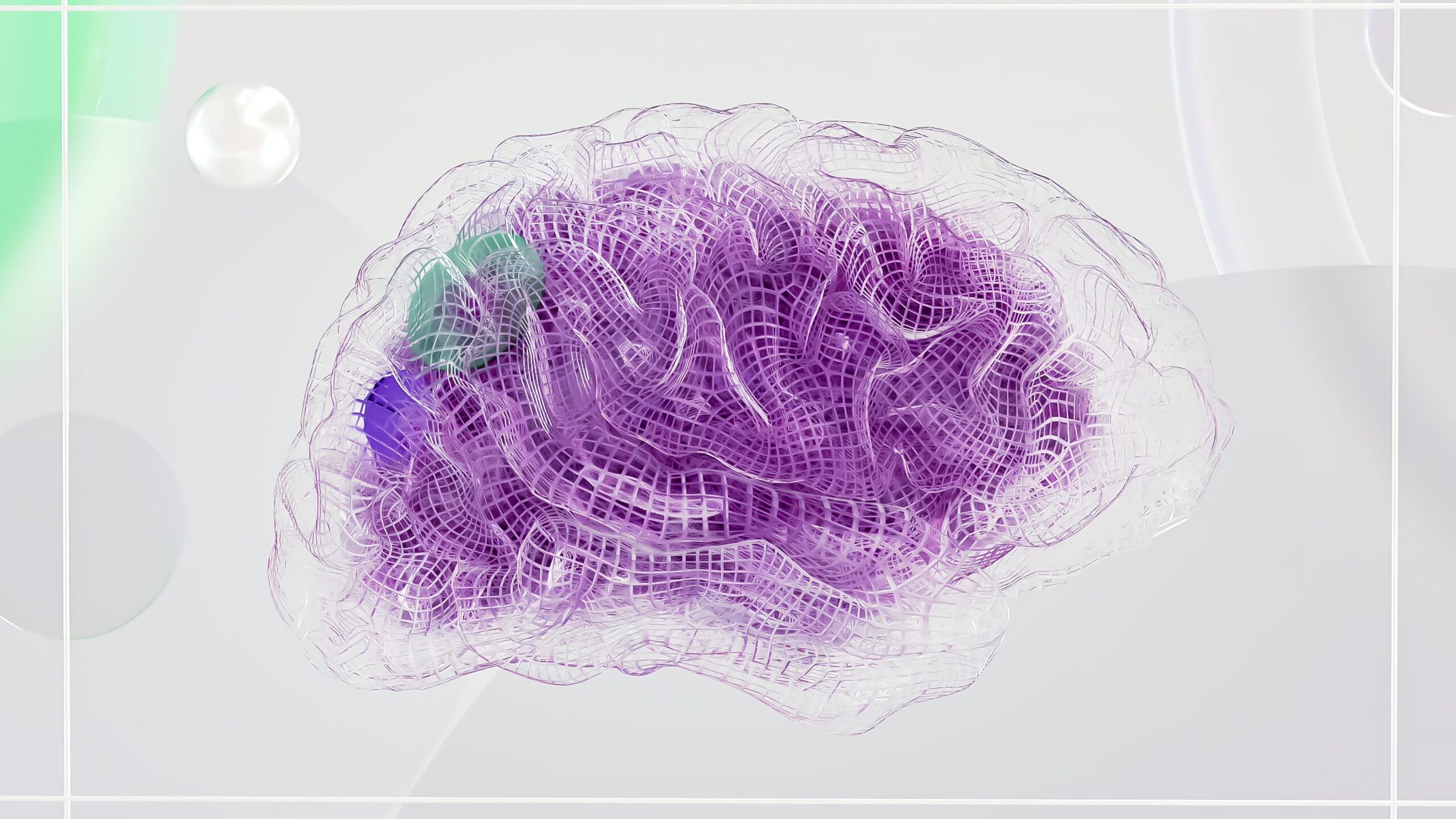


Neuroscientists at Georgetown University Medical Center and Germany’s Technische Universität München explored the neural mechanisms that are responsible for chronic pain and tinnitus. Mechanisms that normally moderate sound and pain signals essentially fail, leading to an ongoing, chronic perception of these sensations.
Researchers noted that in both chronic pain and tinnitus, the brain has retrained itself to constantly feel or hear sensations caused by an injury. Josef Rauschecker, PhD, DSc says, “Some people call these phantom sensations, but they are real, produced by a brain that continues to ‘feel’ the initial injury because it cannot down-regulate the sensations enough. Both conditions are extraordinarily common, yet no treatment gets to the root of these disorders.”
Dr. Rauschecker adds that since these brain systems rely on the transmission of dopamine and serotonin – chemicals which regulate pleasure and the sense of well-being – drugs that work to modulate these chemicals may help lessen the impact of chronic pain and tinnitus.
Abnormal Resting-State Functional Connectivity of the Anterior Cingulate Cortex in Unilateral Chronic Tinnitus Patients
Researchers have not settled on a single cause of chronic pain and tinnitus. A study explores the possibility that another part of the frontal cortex, called the anterior cingulate cortex (ACC), is thought to be involved in chronic subjective tinnitus. In this study, chronic tinnitus patients were shown to have disrupted signals and patterns of ACC within several brain networks, including the auditory cortex, prefrontal cortex, and visual cortex. This study concluded that people with chronic tinnitus have disrupted networks stemming from the ACC and branching to other regions of the brain.
Chronic Pain – How it Might Help Us Find a Treatment for Tinnitus
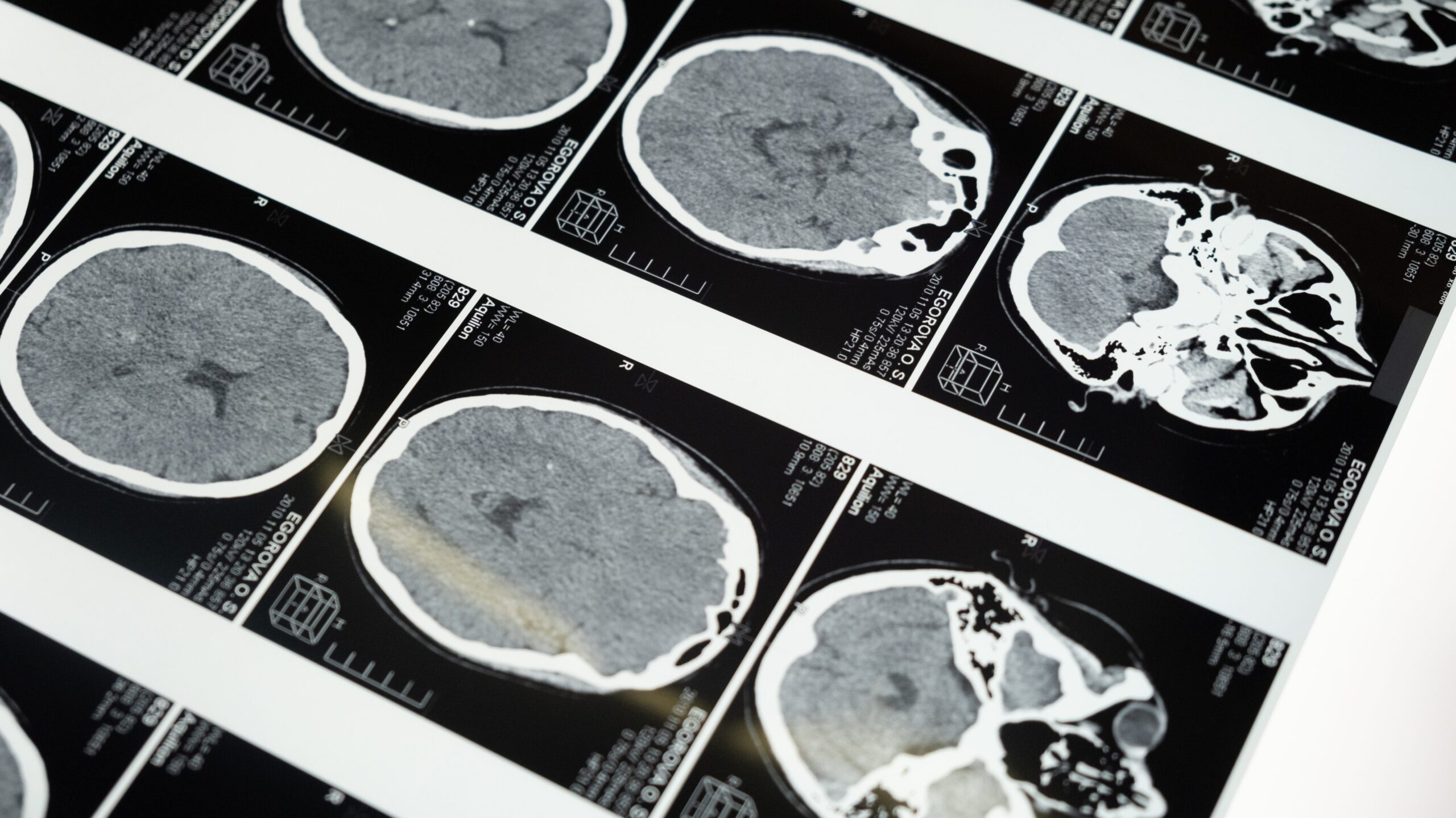


Exploring the brain’s mechanisms for interpreting chronic pain symptoms may help researchers get a better understanding of tinnitus. A project at King’s College London and the University of Nottingham asks if it’s possible to reduce tinnitus by blocking the activity of a specific ion channel associated with chronic pain. This ion channel, called HCN2, is responsible for neuropathic pain signals. When triggered, HCN2 creates an ongoing sensation of pain. A study conducted on mice found that blocking this channel eliminated pain. Additionally, HCN2 channels are found in the auditory system, where nerves can be damaged and trigger tinnitus. This promising study may play a key role in unlocking ways to provide targeted pain management and tinnitus treatment.
Exploring Targeted Treatment Options
Human pain research is still ongoing, so if bothersome tinnitus and chronic pain occur together, it’s important to find the most effective treatment for you. For many people with tinnitus, starting with a hearing test and pursuing treatments like hearing aids, tinnitus retraining therapy (TRT), or sound therapy work well. If you know that your tinnitus is caused by a head injury or other medical conditions, seek help from your physician.
Finally, don’t ignore your emotional experiences with chronic pain and tinnitus. Supporting mental health, no matter the cause of the pain or ringing in your ears, is essential to feeling your best and finding a treatment that works.
Next Step: Book Free Consultation
- 75% of patients reduced their tinnitus within three months after following our recommendations.
- "I feel like Treble Health literally gave me my life back." - Randy S. (verified customer)
- Join thousands of people who have reduced their tinnitus after scheduling a free consultation.






